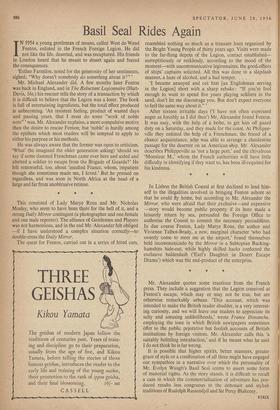Basil Seal Rides Again
IN 1954 a young gentleman of means, called West de Wend Fenton, enlisted in the French Foreign Legion. He did not like the life, deserted, and was recaptured. His friends in London heard that he meant to desert again and feared the consequences.
`Esther Farmiloe, noted for the generosity of her sentiments, sighed; "Why doesn't somebody do something about it?"' Mr. Michael Alexander did. A few months later Fenton was back in England, and in The Reluctant Legionnaire (Hart- Davis, 16s.) his rescuer tells the story of a transaction by which it is difficult to believe that the Legion was a loser. The book is full of entertaining ingredients, but the total effect produced is unbecoming. 'An insistent feeling, product of wasted days and passing years, that I must do some "work of noble note" ' was, Mr. Alexander explains, a more compulsive motive than the desire to rescue Fenton; but 'noble' is hardly among the epithets which most readers will be tempted to apply to either his purpose or his methods.
He was always aware that the former was open to criticism. `What' (he imagined the older generation asking) 'should we say if some damned Frenchman came over here and aided and abetted a soldier to escape from the Brigade of Guards?' He felt remorseful, too, about 'insulted France, whom, impatient though she sometimes made me, I loved.' But he pressed on regardless, and was soon in North Africa at the head of a large and far from unobtrusive retinue.
This consisted of Lady Marye Rous and Mr. Nicholas Mosley, who seem to have been there for the hell of it, and a strong Daily Mirror contingent (a photographer and one female and one male reporter). The alliance of Gentlemen and Players was not harmonious, and in the end Mr. Alexander felt obliged —if I have understood a complex situation correctly—to double-cross the Daily Mirror.
The quest for Fenton, carried out in a series of hired cars, resembled nothing so much as a treasure hunt organised by the Bright Young People of thirty years ago. Visits were made to the far-flung depots of the Legion, contact established— surreptitiously or recklessly, according to the mood of the moment—with uncommunicative legionnaires, the good, offices of ships' captains solicited. All this was done in a slapdash manner, a haze of alcohol, and a bad temper. . . .
`I became annoyed and cut him [an Englishman serying in the Legion] short with a sharp rebuke : "If you're fool enough to want to spend five years playing soldiers in the sand, don't let me discourage you. But don't expect everyone to feel the same way about it."' After sixteen irritable days CI have not often expressed anger as forcibly as I did then') Mr, Alexander found Fenton. It was easy, with the help of a bribe, to get him off guard duty on a Saturday, and they made for the coast. At Philippe- ville they enlisted the help of a Frenchman, the friend of a chance acquaintance, who was able to arrange a clandestine passage for the deserter on an American ship. Mr. Alexander describes Philippeville as 'not a large port.' and the chivalrous `Monsieur M.,' whom the French authorities will have little difficulty in identifying if they want to, has been ill-requited for his kindness.
In Lisbon the British Consul at first declined to lend him- self to the illegalities involved in bringing Fenton ashore so that he could fly home, but according to Mr. Alexander the Mirror, who were afraid that their ,exclusive—and expensive —story would become public property if its hero made a leisurely return by sea, persuaded the Foreign Office to authorise the Consul to commit the necessary peccadilloes. In due course Fenton, Lady Marye Rous, the author and Vivienne Talbot-Brady, a new, marginal character 'who had sweetly come to meet me at the airport,' found themselves held incommunicado by the Mirror in a Subtopian Bucking- hamshire hide-out, while highly skilled hacks confected the exclusive balderdash (`Earl's Daughter in Desert Escape Drama') which was the end-product of the enterprise.
* Mr. Alexander quotes some reactions from the French press. They include a suggestion that the Legion connived at Fenton's escape, which may or may not be true, but are otherwise remarkably urbane. 'This account, which -was intended to make the British reader shudder, is a very interest- ing curiosity, and we will leave our readers to appreciate its salty and amusing unlikelihoods,' wrote France Dimanche, employing the tone in which British newspapers sometimes Offer to the public pejorative but foolish accounts of British institutions by foreign visitors. Mr. Alexander calls this 'a suitably belittling introduction,' and if he meant what he said I do not think he is far wrong.
It is possible that higher spirits, better manners, greater grace of style or a combination of all three might have engaged our sympathies in a narrative over which the personality of Mr. Evelyn Wa-ugh's Basil Seal seems to assert some form of manorial rights. As the story stands, it is difficult to recall a case in which the commercialisation of adventure has pro duced results less congruous to the debonair and stylish traditions of Rudolph Rassendyll and Sir Percy Blakeney.
STRIX


































 Previous page
Previous page